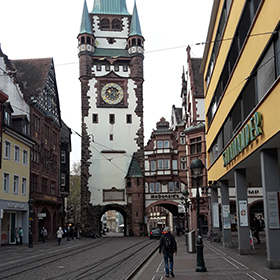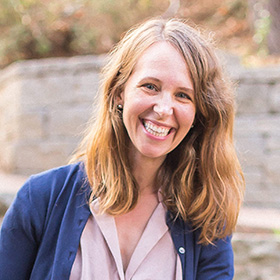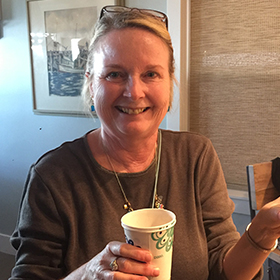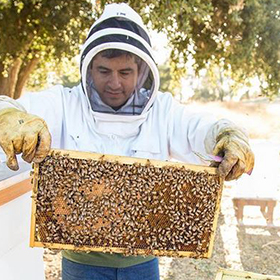Faculty Activities

Dr. Benjamin Timms led the Cal Poly Global Program in Thailand and Cambodia in summer 2018 where 35 students spent five weeks studying, going on field trips, and taking part in activities designed to engage them in cultural, economic, political and environmental aspects of Southeast Asia. In winter 2019, he went abroad again, this time to Australia, with similar immersive activities and experiences. He presented a paper at the Annual Meeting of the California Geographical Society in May entitled, “Reflecting on Faculty Led Study Abroad Programs: Lessons Learned and Suggestions for Success.” In all of these endeavors, he includes anthropology-geography and sociology students in education, research, publication and global experiences. Beginning fall 2019, he will take the helm as chair of the Social Sciences Department.

Dr. Robert Schaeffer traveled to Freiburg, Germany in April to present a paper on delinking from the world-economy at the 43rd annual Political Economy of the World-System Conference. Participants convened at Albert Ludwigs University, where Max Weber, one of the founders of Sociology, studied as an undergraduate. Schaeffer also signed a contract with Routledge to write a new book: "After Globalization: Understanding Crisis and Disintegration." This will be Schaeffer's eleventh book.

This year, Dr. Unique Shaw-Smith received the Significant Contribution - Faculty award at the 33rd annual Cal Poly Community Service Awards. Her service has spanned three years and involves using students to develop programs and projects in the library at the California Men’s Colony (CMC), a state prison neighboring Cal Poly. This year her students worked with incarcerated men on two projects. The first project, called Pitch Power, was developed and implemented with help from senior project student Marlon Gonzalez. Gonzalez helped develop the manual for facilitators and participants for the public speaking group. The second project, called Silent Screams, was spearheaded by senior project student Lindsay Miller and is an anthology of poetry written by incarcerated artists, which will be available for purchase later this year via Amazon.
In the fall, Shaw-Smith presented, “Emerging Research on Inmate Perceptions of the Incarceration Experience,” at the American Society of Criminology’s annual conference in Atlanta, Georgia. Shaw-Smith also served as a BEACoN research mentor this year and developed a research proposal with architecture senior Tunmi Da Silva. The project, which sought to look at institutional differences on the self-concept comparing Cal Poly and CMC, was not approved by the California Department of Corrections and Rehabilitation (CDCR) because there were no tangible benefits for the agency. Shaw-Smith and Da Silva presented their proposal and experiences at the 2nd annual BEACoN Research Symposium.
Shaw-Smith had an active year supporting campus and local organizations. She spoke on nine different panels, advised two student organizations, served as the faculty partner for the Black Academic Excellence Center and on the President’s Advisory Council. She ended the year with a kickball victory at the annual Social Sciences BBQ alongside students from her Criminological Theory course.

In winter and spring 2019, Dr. Stacey Rucas convened a new student research group to investigate the evolutionary mating trends and intrasexual competition present in top Billboard hits for the last several decades. Students, under her guidance, conducted content analysis of lyrics and statistical analysis testing empirical predictions derived from theory, thus combining a mixed-methods approach to the project design. Results of this work were presented at the annual California Workshop on Evolutionary Social Sciences last April held at Cal State Fullerton. This fall, Rucas will be on sabbatical to write-up results of several years of faculty-student research projects. During summer 2019, she directed the Cal Poly Thai Studies program, which involved escorting 35 students for a cultural emersion experience across Southeast Asia in the Learn by Doing tradition. She will direct this program again in summer 2020.

Dr. Sara Lopus completed her second year as an assistant professor at Cal Poly, reinstating a “sunsetted” course called SOC 431: World Population Processes and Problems. She participated in the Inclusion Starts with Me Teach-in for a second year, presenting a standing-room-only talk called “Cal Poly Privilege: Analyzing and Interpreting our Campus Demographics.” Along with her SOC 355: Quantitative Methods students and two senior project advisees, Lopus gathered and analyzed data to aid the local non-profit, Community Action Partnership of San Luis Obispo County (CAPSLO) in better understanding the lack of childcare options in SLO county. Lopus’s co-authored paper, “Visualizing Africa’s Educational Gender Gap” was published last summer in the journal, Socius. In October, she presented a paper,“Regional Migration, Global Climate Change, and the Future of Irrigation on Kenyan Farms,” at the International Conference on Migration, Environment, and Climate in Paris, France. In November, she presented a paper called “Assortative Mating across Africa’s Educational Expansion” at the Sustainability and Development Conference at the University of Michigan. In February, Lopus and a colleague gave an invited talk at UC Berkeley’s Demography Brownbag Seminar. Their co-authored paper, “From privilege to prevalence: Contextual effects of women’s schooling on African marital timing” (published last December in the journal Demography), received the American Sociological Association’s Article of the Year Award in the Family Section.

Dr. Martine Lappé completed her first year as an Assistant Professor of Sociology with point responsibilites in the CLA's Science, Technology and Society (STS) at program Cal Poly. Her teaching included two quarters of ISLA 456: Advanced Project-Based Learning in Science, Technology, and Society for the STS minor program, and the development of a new SOC 470: Advanced Topics course on Sociology of Health and Medicine that she will teach in spring 2020.
Lappé arrived at Cal Poly in fall 2018 the recipient of a prestigious five-year Career Development Award from the National Human Genome Research Institute (NHGRI)’s Ethical, Legal, and Social Implications (ELSI) Program. This highly competitive grant provides support for Lappé’s interdisciplinary research team at Cal Poly, including sociology and anthropology-geography majors, to examine the social and ethical impacts of epigenetic research related to children’s health. The research they conducted this year has been accepted as part of a special working group on social justice and will be presented at the Society for Social Studies of Science (4S) meeting in New Orleans, Louisiana, in fall 2019.
In addition to her teaching and work with students, Lappé presented her research at the American Anthropological Association (AAA) meeting in San Jose, California, in November 2018 as part of an invited session by the Society for Medical Anthropology. In winter 2019, she and her co-panelists developed a grant proposal to the United Kingdom’s Wellcome Trust, and in spring 2019 they were awarded two years of funding to develop an international network of experts who will examine the impacts that birth cohort studies have on lived experiences of health and global health policy making.
Here at Cal Poly, Lappé founded a new interdisciplinary research group to promote Learn by Doing opportunities related to health, science and technology on campus and in our surrounding communities. With support from the CLA's Center for Expressive Technologies, she organized and hosted a reception to launch this program in May 2019. The event included faculty, students and staff from across Cal Poly and has already inspired several research collaborations, including a pilot study that Lappé initiated in collaboration with Professor Suzanne Phelan in Public Health and Assistant Professor Jean Davidson in Biological Sciences to explore the how medically under-served communities experience reproductive health care through the Cal Poly Mobile Health Unit.
This year, Lappé also had the privilege to serve on the selection committees for the Center for Expressive Technology's Seed Grant Awards and the American Sociological Association’s (ASA) Science, Knowledge, and Technology Section Graduate Student Paper Award. In August 2019, she presided over a round table titled “In Pursuit of Health: Patient Care and Medical Knowledge” at the ASA meeting in New York. Lappé’s publications this year include “The Paradox of Care in Behavioral Epigenetics: Constructing Early-Life Adversity in the Lab,” in the journal BioSocieties, and an invited review titled, “Environmental Politics of Reproduction,” for the Annual Review of Anthropology.

For the third consecutive year, Dr. James Keese taught on the Cal Poly in Peru study abroad program during spring 2019. He spent eight weeks in Cusco with 18 students, including eight anthropology and geography majors and three sociology majors. The trip included multi-day excursions to Machu Picchu, Lake Titicaca and the Amazon rainforest. The students also continued work on the improved wood-burning cookstoves project in another indigenous community. New this year, the group took an optional four-day trip to Arequipa and the Colca Canyon to see condors and hike one of the deepest canyons in the world. Keese presented a paper titled “LPG cookstove use and fuel subsidies in the Cuzco Region of Peru” at the Annual Meeting of the Association of Pacific Coast Geographers in Reno, Nevada. He was also the faculty advisor for the Social Sciences Department’s annual career fair.

Dr. Terry Jones completed his 12th and final year as department chair in 2018-19. In November, Jones traveled to Sacramento to receive the Governor’s Award for Historic Preservation for his work with students preserving archaeological sites on the Diablo Canyon Nuclear Power Plant property. The work was done in collaboration with PG&E and the tityu tityu yak tiłhini, Northern Chumash Tribe of San Luis Obispo County. With former student, Brian Codding, he published a chapter, “The Native California Commons: Ethnographic and Archaeological Perspectives on Land Control, Resource Use, and Management,” in the book, Global Perspectives in Long Term Community Resource Management, edited by Ludomir R. Lozny and Thomas H. McGovern (Springer 2019). He delivered a paper, “An Update on the Flightless Duck (Chendytes lawi) from the Pecho Coast, San Luis Obispo County,” at the annual meeting of the Society for California Archaeology in Sacramento in March. Students from his laboratory class also presented a poster at the meetings. In April he delivered a paper, “Men and Women, War and Peace in Prehistoric Central California,” (co-authors Al W. Schwitalla and Marin Pilloud), in a session, Women Warriors, at the annual meeting of the Society for American Archaeology in Albuquerque, New Mexico.

Dr. Liz Johnston is completing her third year as a tenure track faculty member. In the fall, she presented a poster, “Why Does Childhood Trauma Matter to Older Adults? Intersections of Adverse Childhood Experiences (ACEs), Adult Trauma, Spirituality and Critical Illness at End of Life” at the 47th Annual Scientific and Educational Meeting of the Canadian Association on Gerontology, Vancouver, Canada.
In May, Johnston helped facilitate a session on “Loss and Grief in Frontal Temporal Dementia” at the 2019 Association for Frontal Temporal Dementia Education Conference in Los Angeles.
In July, Johnston presented a poster: “Difficulties in Recruitment of Research Subjects for Alzheimer’s Disease Research Trials” at the Alzheimer’s Association International Conference in Los Angeles.
In September 2018, Johnston began a two-year term as the Sociology Internship Coordinator. Using her community social work contacts, she located a number of new internship positions for students. Perhaps the most interesting is New Life K9, a non-profit agency that trains service dogs for Veterans and First Responders with PTSD. Student interns will work with New Life staff at the California State Prison, teaching inmates to train the service dogs. The inmates are given a new sense of purpose through training the dogs and then the veterans and first responders receive the trained service dogs at no cost.
Johnston also met with staff from Campus Police, the San Luis Obispo Police Department and Chief Deputy Probation Officer Tom Milder to revitalize the internship process for Criminology Concentration students. These meetings resulted in new guidelines and outreach to students. As a result, six students will begin law enforcement-related internships this fall.
In the community, Johnston continues to facilitate a support group for caregivers of persons with FTD, an early onset dementia.
Johnston is the most proud of a fun part of being a faculty member: serving as an advisor for student clubs. In 2018-19 she served as advisor for both the Social Sciences Club and the Cal Poly Archery Club. Both had outstanding student leadership this year that helped them to increase the number of active members. Both also had well attended potlucks and movie nights at Johnston’s home. The Social Sciences Club had a booth at Week of Welcome (WOW) for the first time in 10 years!

Dr. G. Andrew Fricker completed his first year as an assistant professor at Cal Poly, teaching GEOG 328: Applications of Remote Sensing, GEOG 318: Applications of Geographic Information Systems and GEOG 350: The Global Environment. He gave an invited guest seminar for faculty and graduate students in the Biology Department called “Using Remote Sensing, Geographic Information Systems (GIS) and Big Data to Study Ecological Systems.” Fricker presented his newest research in a poster session in the American Geophysical Union Meeting in Washington, D.C. in December 2018 titled “Deep images require Deep Learning: A Convolutional Neural Network Classifier Identifies Tree Species in a Mixed Conifer Forest from Hyperspectral Imagery.”
Fricker was the lead author of a paper titled “More than Climate? Predictors of Tree Canopy Height Vary with Scale in Complex Terrain, Sierra Nevada, CA (USA)” published in Forest Ecology and Management, and he co-authored a paper titled “LiDAR-derived Topography and Forest Structure Predict Fine-scale Variation in Daily Surface Temperatures in Oak Savanna and Conifer Forest Landscapes” published in Agricultural and Forest Meteorology. Due to his research with the National Ecological Observatory Network (NEON), he was asked to serve on their technical advisory board and steering committee that helps guide scientific decisions related to NEON remote sensing and field data collections across the United States.
Fricker co-founded a research group at Cal Poly with two faculty members (Dr. Maria Pantoja and Dr. Jonathan Ventura) from the Computer Science and Software Engineering Department called “AI4Sci,” which uses artificial intelligence to extract meaningful information from imagery, with his personal focus on using neural networks to analyze geospatial imagery. The “AI4Sci” group organized a deal with the Orfalea School of Business to host their research activities on Amazon Web Services in the 2019-20 academic year, thanks to a generous alumni donation creating an inter-departmental/inter-college research and teaching partnership. His new research group developed three proposals, and was awarded an internal Research, Scholarly and Creative Activities (RSCA) grant to study the spatial dynamics of the recent Camp Fire in Paradise, California, as well as being awarded over $10,000 in Azure Cloud Computing credits from Microsoft and National Geographic to continue research on highly endangered birds in Kauai. Fricker was asked to provide GIS expertise to a multidisciplinary team from NRES and Biological Sciences on a grant extension to develop mobile-first formatting for all Urban Forest Ecosystem Institute resources on a Department of Forestry and Cal Fire grant extension.
Fricker reached out to the local SLO community by attending GIS Day with students hosted by the SLO GIS user group, recruiting potential student employers at the SLO GIS user group, volunteering with students at the SLO Community Food Bank, and hosting a geocaching event titled “The Art of the Cache” at the Studios On the Park in Paso Robles. Finally, Fricker founded the Mustang Map Lab, an ASI-sanctioned club for students particularly interested in GIS, building their skills, making connections to other students interested in GIS outside of their department and most importantly connecting with employers to get great GIS jobs and internships in the San Luis Obispo area and beyond.

This year, Dr. Coleen Carrigan was awarded early promotion to Associate Professor. In her cultural anthropology class, she assigned an ethnographic project that asked students to investigate the culture of whiteness at Cal Poly, generating substantive data that supports university-wide goals to promote diversity and inclusion at Cal Poly. The assignment was part of a larger research endeavor—Advancing Cultural Change (ACC)— an on-going project funded by Cal Poly's Provost’s Office, the CSU'S Chancellor’s Office and the National Science Foundation (NSF), in which over 800 undergraduate researchers have participated thus far. Carrigan also co-facilitated three NSF-funded symposia for women in science, two in collaboration with University of New York at Buffalo and another in collaboration with the University of Washington and North Carolina State University.
Carrigan published two papers, one on best practices for engaging departmental leaders in culture change efforts in academia and the other regarding class stratifications in engineering education. She presented other findings from her ACC project on epistemic bias in student culture at the Society for the Social Study of Science (4S) Conference in Sydney, Australia and made another presentation on counterspaces for women of color in science at the Collaborative Network for Engineering and Computing Diversity Conference (CoNECD) in Crystal City, Virginia. As the founder and director of the Carrigan Lab, which consists of four funded research programs, Carrigan continues to lead a team of six undergraduate researchers and one doctoral scholar who use ethnography to study culture in science and technology and create and facilitate case studies based on this data. She and her team presented four of their case studies this year in both local and national venues and turned two cases into films for broad dissemination and impacts.

Dr. Ryan Alaniz had a productive year. Professionally, he presented on his post-disaster community building research at the Universidad Autonoma de Barcelona and the University of Southern California. He is also writing a new book, "Insights of the Incarcerated: A Subaltern Approach to Social Problems," which draws on incarcerated people and undocumented field laborer narratives to illustrate how sociological concepts and theories help us make sense of the world. Personally, he continues to work closely with the San Luis Obispo city mayor's office and Restorative Partners to address local issues of injustice. On the farm, he continues to care for the garden, orchard, goats, chickens and bees.

